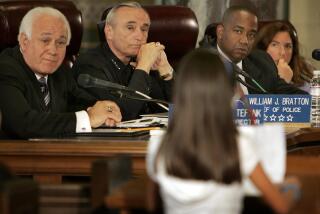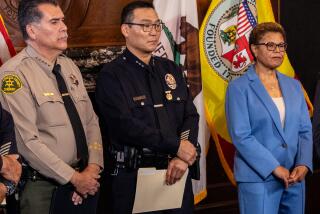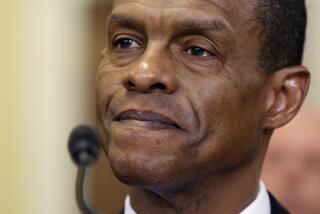Bratton as advisor doesn’t sit well with some British police
News that Prime Minister David Cameron had asked former Los Angeles Police Chief William J. Bratton to be an unpaid advisor in the wake of riots in Britain’s major cities recently has rankled some among the law-and-order ranks, who complain that the government was ignoring their homegrown expertise.
Cameron’s office confirmed Saturday that Bratton, who served as Los Angeles’ police chief from 2002 to 2009, had agreed to consult with British law enforcement on gang violence and the social unrest behind the riots.
“As the prime minister said in his statement to Parliament yesterday, he is keen for the government to draw on experience and expertise developed in other countries as well as in the U.K.,” a statement from Cameron’s office said. “Bill Bratton, who has long-standing links with British policing, will be providing this advice in a personal capacity and on an unpaid basis.”
Bratton, who has been bandied about as a dark-horse candidate for the vacant post of chief commissioner for Scotland Yard, acknowledged in an interview with the Financial Times that Britain’s latest disturbances were not comparable to the Los Angeles riots of 1992 — long before he was police chief in the city.
But he said that “the issue of why kids join gangs is pretty universal: They want to belong to something. They feel disenfranchised; many come from broken homes without parents in any sense of the word.”
Although there was no criticism of Bratton’s expertise and success in tackling U.S. crime and gang culture, voices of discontent over Cameron’s decision to seek advice from an outsider emerged from police ranks.
Siobhan Sagar, a detective inspector from London’s police, said: “We just feel that it’s a sad indictment of what the government think of our senior officers in this country. They do have decades of experience of policing in this country and understand the U.K. law fully.”
In the wake of criticism that officers stood by while rioters looted and burned buildings, Sagar defended the rank and file.
“The hours they’ve been working are enormous,” she said. “They’ve shown a huge amount of commitment and will go on doing so while these current exigencies last.”
Mark Crake, a recently retired police officer who saw frontline service in London during the race riots that raged there and in other ethnically mixed cities in 1981, is a vociferous critic of Cameron’s decision and has harsh words for politicians who, he believes, “do not understand what policing is all about.”
“To micromanage, or get so-called experts in, instead of listening to their own police chiefs and their own experienced officers in the Met [Metropolitan Police] is a slap in the face for British policing. No disrespect to the Americans, or to Mr. Bratton,” he said, “but they’re a completely different culture, different ways of policing.... Either [Cameron is] not prepared to listen or he has no faith in them.”
There has also been criticism of the government’s austerity program, which calls for cuts in police budgets and staffing over the next four years. Cameron spoke of a 6% budget cut in Parliament last week, which he said was still achievable despite calls, including from London Mayor Boris Johnson, to abandon the plan.
Chancellor of the Exchequer George Osborne said in a BBC radio interview Saturday that the government was still “committed to the plan we have set out for police reform. And it is about reform, about improving the presence of the police in our communities, making the police more visible.”
“We want an effective police service,” he said. “They have done an amazing job this week. We want to use the advice of people like Bill Bratton to really tackle some of the deep-seated social issues like gang culture.”
Yet the model of community-linked policing is a long British tradition, Crake said. “Neighborhood policing, the principle of community policing … is key; you’ve got to have public support. But the police officer also has to be able to prevent disorder.”
Stobart is a news assistant in The Times’ London bureau.
More to Read
Start your day right
Sign up for Essential California for news, features and recommendations from the L.A. Times and beyond in your inbox six days a week.
You may occasionally receive promotional content from the Los Angeles Times.






